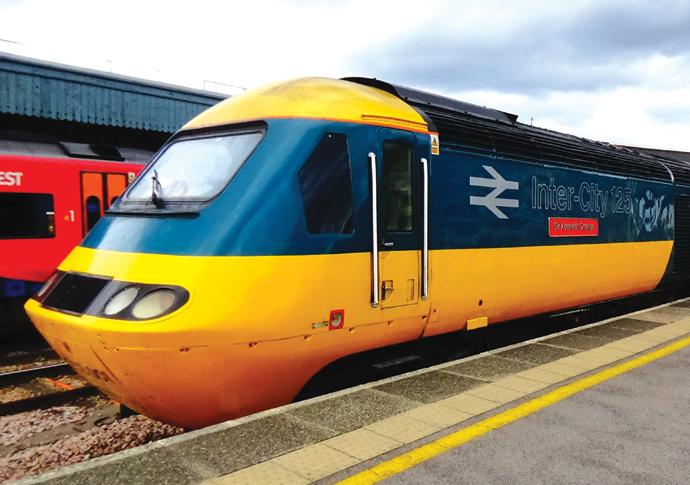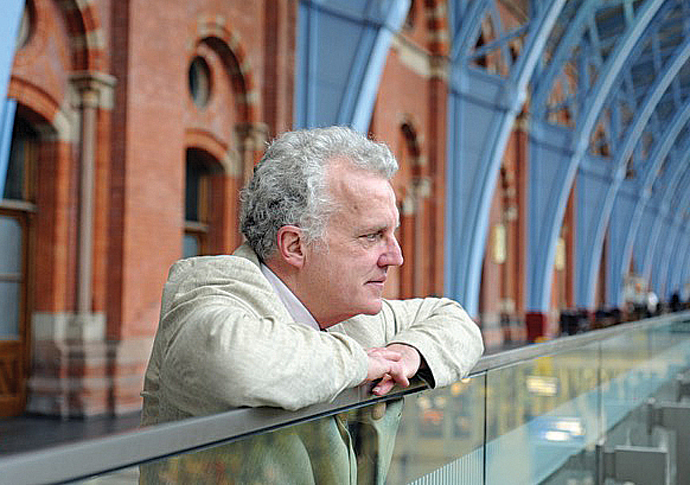Chuffed to bits
Breaking up British Rail was a mistake and fares should be simplified. Peter Gruner follows Christian Wolmar’s train of thought
Thursday, 25th August 2022 — By Peter Gruner

An Intercity 125. Photo: Andrew Bryant
BRITAIN’S most prestigious railway commentator, Holloway-based Christian Wolmar, has called for cheaper fares, creative thinking, and oh, please… a little less of the irritating recorded Tannoy announcement: “See it, say it, sorted.”
In an interview with Review, Christian, launching his latest book, British Rail: A New History, outlined how the service could get more people back on trains.
He campaigned to become London Mayor for Labour in 2016, and revealed that he may still have political ambitions.
Christian called for a simple new basic fare for long and short journeys that would remove the kind of “crazy” charges for tickets, often involving hundreds of pounds, that make passengers feel they have to resort to the car.
He’s not critical of all rail systems and on a positive note, he describes the enormous success of his local North London line, with its Highbury hub, as an example of what can be achieved by the public sector, in this case Transport for London. But he added that the current fares system is “complex, unworkable and incomprehensible to many”.
He spoke out after rail chiefs urged more people to let the train take the strain despite the disruption over the pandemic, threat of strikes and recent heatwaves.
Christian would take a leaf out of many of Europe’s leading railways and re-nationalise Great British Rail (as it’s now known) to provide one organisation rather than many private businesses.
“European railways are mainly state-run,” he said, “and one rarely sees the same financial woes as we do in Britain. The cost of railways in the UK is going through the roof because so many private organisations are involved.”
He sympathised with many of our readers who complain about overcrowded carriages, lack of staff and dirty toilets.
Christian points out in his fascinating book that despite cynics at the time complaining of stale sandwiches, prior to privatisation British Rail did actually run a good service.
He also suggests that the railways could today use a bit of imagination and attract more passengers by providing decent food, space on the train for meetings and where small children could play.
He also wonders if railway operators might try not to irritate travellers so much. Christian added: “What railway traveller is not driven mad by the expression ‘see it, say it, sorted’ repeated 20 times or more on a relatively short journey and repeated at every station.”

Christian Wolmar at St Pancras
Christian names Barbara Castle MP, the first ever woman Minister of Transport, as one of the heroes of rail back in the early 1960s. “Up until then the role had been seen as a male preserve for boys to play with toys.”
There were no women train drivers until 1978. And until Castle’s arrival policy was skewed towards roads, which she, as a non-car driver, was determined to change.
Castle helped to bring about the 1969 Transport Act, which, among other things, helped co-ordinate train with bus travel. She also took action over claims at the time of racial discrimination among rail workers.
There are numerous villains from both parties mentioned in the book. Interestingly, Beeching, infamous for massive cuts to the rail network in the late 60s, is not entirely criticised. “Beeching understood that turning around British Railways would require not only better financial management and business practices, but also a corporate identity that focused it on the future, instead of the past.”Although British Rail in the 1970s compared favourably with Europe, wages were low due to a low Government subsidy.
Another issue of that decade was the drinking culture prevalent in many industries. It was not unknown for a train driver to down a quick pint or two during turnaround at terminus stations like Victoria or Waterloo. Today, of course, there is zero tolerance of alcohol throughout the industry.
Thatcher, when she was prime minister in the 1980s, was, surprisingly, against privatisation. This was partly because it was believed “chuffer” trains were dear to the heart of the British public, and partly due to the mess that had been made of the privatisation of the buses.
She was reported to have described rail privatisation as likely to become the “Government’s Waterloo.” The introduction of the Travel Card in the late 80s and the growing London economy gave a new boost to rail services in the capital. “It helped to reverse the decline of passenger numbers and created something of a boom on London’s vast suburban network,” Christian writes.
He suggests that the privatisation of British Rail almost 30 years ago is the subject of another book. However, he writes that one of the most damning aspects of privatisation was that a successful and highly competent group of managers were completely ignored by the politicians and their advisers.
Christian has said and written many times in the past that breaking up British Rail into dozens of pieces was meant to foster competition and bring about greater efficiency and innovation. He adamantly disagrees. “A railway system is a network in which all parts are connected,” he writes. “Carving out different aspects, such as signalling, engineering, operations and safety management, makes no sense since none is a business in itself. They are all interdependent and need to be run together.”
Back to the North London line, which has been greatly improved and electrified. Christian said: “It’s an incredibly popular route which has made Highbury a hub for Overground and Tube. It just shows how transformational railways are in an urban context. All credit for Transport for London, a public sector organisation.”
• British Rail, A New History. By Christian Wolmar. Michael Joseph £30